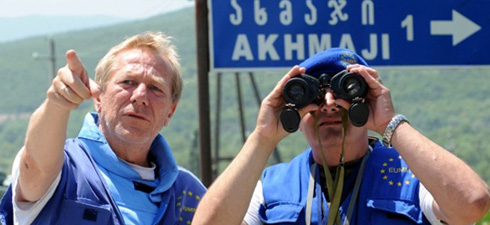Tension in the region "has reached fever pitch, though it is still characterized by a certain surreal quality," notes Il Sole 24 Ore, which further takes the view that "nothing new has occurred to change the abnormal situation that resulted from five days of fighting a year ago — South Ossetia and Abkhazia are in the hands of Moscow, even if (almost) everyone considers that they are still part of Georgia. 3,700 Russian troops are monitoring the borders, observers from the European Union Monitoring Mission in Georgia (EUMM) are supervising the cease-fire, and Georgian President Mikheil Saakashvili is still in power — although he has been seriously weakened by the war, as well as the financial crisis and protests from the opposition."
EU without a reaction doctrine
The war has also "restored Russia's reputation as a formidable contender on the international scene," notes the editor of the review Russia in Global Affairs, Fiodor Lukianov, in an interview with Polish daily Gazeta Wyborcza. Lukianov further adds that "the war put a stop to the expansion of NATO, by demonstrating that there is a real risk of conflict involving one of its member states."
It is a view that is also voiced in French daily Le Monde by the head of the Russia/Newly Independent States centre at the French Institute of International Relations (IFRI), Thomas Gomart: "Washington is now convinced that it should not rush the inclusion of Georgia and the Ukraine in NATO, which could further destabilize the region." However, at the same time he notes that "since the end of the war, the influence of Russia," which has been hit by the financial crisis, "has somewhat declined." Gomart further points out that "Europe's attitude has changed less than the attitudes of the other powers, even though it is the most directly concerned by the conflict." Since the withdrawal, following a request from Moscow, of the OSCE (Organization for Security and Co-operation in Europe) and the United Nations missions, European Union observers are alone in the field. This is a concern for Gomart, because in the event of a skirmish with the Russians or the Georgians, or a resumption of the conflict, "the Union does not have a pre-determined response."
Towards a new conflict
Gomart further notes that diplomatic efforts, which have continued under the patronage of the EU for almost a year, "have failed to break the deadlock," and Il Sole 24 Ore reports that Moscow and Tbilisi are now "reaffirming the reasons that prompted" President Saakashvili's "attempt to regain control" of South Ossetia, and "motivated the Kremlin's campaign to stop him." El País explains that the two former combatants now have to convince the international and independent mission of inquiry into the conflict in Georgia, directed by Swiss diplomat Heidi Tagliavini, which is also taking place under the auspices of the EU, that they acted within their rights. Tagliavini's mission is scheduled to submit its report on the conflict, and the chain of events that led to it, at the end of September. In the meantime, Tagesspiegel reports that she has already established that Georgia clearly contributed to the outbreak of the war. However, the Berlin daily also notes that the EU will have to acknowledge that it did not break any international law. Georgia is still nothing like a western democracy, concludes Tagesspiegel, but experts agree that "its only chance of becoming one involves turning towards Europe."
In the meantime, the current truce remains fragile. Il Sole 24 Ore notes that both parties are behaving "as though they wished to re-create the scenario that prevailed last year, which would inevitably lead to war. On 4 August, having accused the Georgians of mounting a mortar attack on Tskhinvali, the capital of South Ossetia, Russia raised its level of alert, and embarked on 'preventive' military manoeuvers. Tskhinvali has closed the last stretch of border that was still open to Georgia on the pretext that this will avert the possibility of provocative action, and also limit the spread of swine flu. Tbilisi denies any violation of the cease-fire and insists that it has no plans to attack. At the same time, it is accusing Russia of attempting to modify the border, although EU observers have not seen any proof of this." Despite the high level of tension, observers remain divided on the possibility of a resumption of the conflict. In the Paris daily Le Figaro, Russian geostrategy expert Alexander Golts takes the view that "Russia has no reason to become involved in conflict," because it has already attained its objective — which is to send a clear message to the West that it intends to maintain its hegemony in the Caucasus. On the contrary, Pavel Felgenhauer, another Russian military expert, is convinced that "Russia is preparing the terrain for a new war against Georgia," and this time it intends "to overthrow" Mikheil Saakashvili.
Was this article useful? If so we are delighted!
It is freely available because we believe that the right to free and independent information is essential for democracy. But this right is not guaranteed forever, and independence comes at a cost. We need your support in order to continue publishing independent, multilingual news for all Europeans.
Discover our subscription offers and their exclusive benefits and become a member of our community now!












